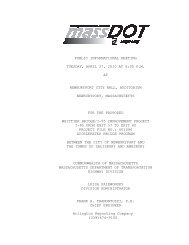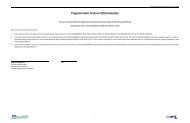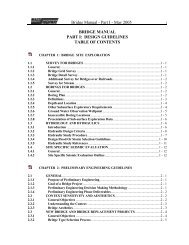Herbicide Alternatives Research - Executive Office of Transportation
Herbicide Alternatives Research - Executive Office of Transportation
Herbicide Alternatives Research - Executive Office of Transportation
You also want an ePaper? Increase the reach of your titles
YUMPU automatically turns print PDFs into web optimized ePapers that Google loves.
included side-by-side comparisons, effects <strong>of</strong> increased concentrations, effects <strong>of</strong> repeat<br />
applications, as well as effects <strong>of</strong> preparation <strong>of</strong> test plots by mowing.<br />
• Clove oil or citric acid and acetic acid formulations had little effectiveness throughout the<br />
season, weed masses in these plots approached or equaled that <strong>of</strong> untreated plots. As these<br />
herbicides are defoliants, they do not kill crowns and therefore do not prevent plants from<br />
sending up new growth.<br />
• Pelargonic acid showed strong suppression soon after application, but its effectiveness<br />
dissipated by the fall. As with the other acids, this was attributed to inability to kill crowns<br />
or seedlings emerging after application.<br />
• Clove oil, pelargonic acid, and glyphosate were tested on sumac and vines (grape and<br />
poison ivy). All treatments demonstrated effective suppression <strong>of</strong> sumac by the end <strong>of</strong> the<br />
season. Clove oil generally was unsatisfactory on the vines by the end <strong>of</strong> the season.<br />
Pelargonic acid initially appeared to be effective on the vines, yet its effectiveness started to<br />
diminish by the end <strong>of</strong> the season. By comparison, the conventional herbicide, glyphosate<br />
was initially ineffective but very effective by the end <strong>of</strong> the season.<br />
• Doubling the concentrations <strong>of</strong> clove oil, pelargonic acid and limonene demonstrated<br />
negligible benefit relative to the recommended concentration rate.<br />
• Plots mowed prior to treatment demonstrated no additional suppression relative to the unmowed<br />
plots. In fact, mowing seemed to suppress, rather than enhance, the efficacy <strong>of</strong> the<br />
herbicides. The investigators speculated that the longer shoots in the un-mowed plots may<br />
have provided more area <strong>of</strong> plant exposure to the herbicides, thus increasing their efficacy.<br />
• Repeat applications (two or three applications) <strong>of</strong> alternative herbicide over the growing<br />
season were necessary to achieve vegetation control comparable to that achieved by a single<br />
application <strong>of</strong> conventional herbicide.<br />
• Corn gluten meal applied at varying rates on plots prepared with a weed torch or glyphosate<br />
demonstrated little suppressing effect on weed growth by itself. Pre-burned plots showed<br />
vegetation increasing with increased applications <strong>of</strong> the meal. Plots pretreated with<br />
glyphosate showed continued control <strong>of</strong> vegetation throughout the season, but the corn<br />
gluten meal did not suppress growth. Weed mass from the corn gluten meal plots was the<br />
largest <strong>of</strong> any treatment, and plants in these plots were growing vigorously at the final date<br />
with few signs <strong>of</strong> senescence, most likely due to the fact that corn gluten meal is a nitrogen<br />
fertilizer.<br />
Mechanical Methods<br />
• Mulches (bark, woodchip) applied at 2 to 3 inch thickness after preparation (burning was<br />
used as preparation for this research) gave season-long control <strong>of</strong> vegetation and had the<br />
least end-<strong>of</strong>-season weed mass <strong>of</strong> all <strong>of</strong> the treatments. Mulches did not need to be reapplied<br />
for the second year <strong>of</strong> research and were considered to have controlled vegetation<br />
ES 4
















